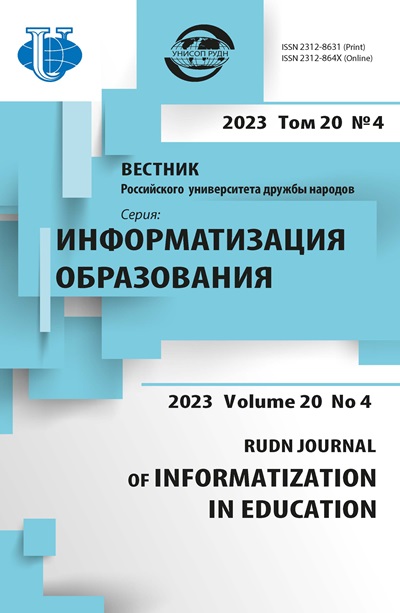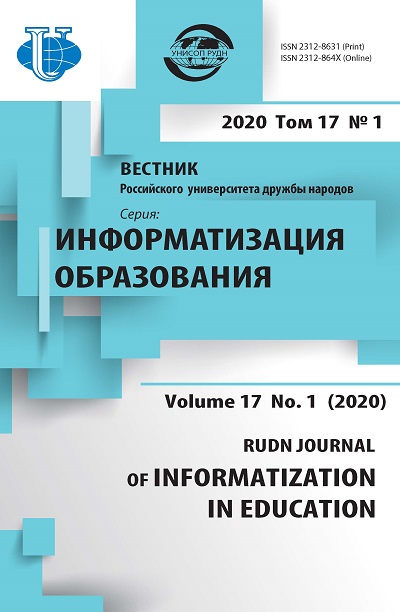Possibilities of telecommunicational training and information system and MOOC in comprehensive solution of tasks of teaching foreign students in Russian universities
- Authors: Beloglazov A.A.1, Beloglazova L.B.2, Malkov I.M.3, Antonova N.A.2, Alekseeva L.A.2, Kopylova P.A.2, Novoselova N.V.2, Pudovkina S.D.2, Beloglazova I.A.4
-
Affiliations:
- Moscow State University of Humanities and Economics
- People Friendship University of Russia (RUDN University)
- M.K. Ammosov North-Eastern Federal University
- Automation Center, LLC
- Issue: Vol 17, No 1 (2020)
- Pages: 26-35
- Section: EDUCATIONAL ELECTRONIC PUBLICATIONS AND RESOURCES
- URL: https://journals.rudn.ru/informatization-education/article/view/23700
- DOI: https://doi.org/10.22363/2312-8631-2020-17-1-26-35
Cite item
Full Text
Abstract
Problem and goal. The article actualizes the problem of integrating the capabilities of a massive open online course (MOOC) and a telecommunicational training and information system (TUIS) of the university, taking into account the identification of opportunities for this integration for a comprehensive solution of the problems of teaching foreign students at the university. Methodology. One of the most effective solutions in the framework of the considered prospects for the development of a modern university is the integration of MOOC and TUIS systems. Results. The possibilities of innovative forms of distance education for the organization of the educational process in the university are revealed. The perspective possibilities of integration of the MOOC and the telecommunication educational and information system within the functioning of the modern digital educational environment of the university are identified and disclosed. Conclusion. The integration of MOOC and TUIS systems allows to neutralize the nuances associated with the orientation of MOOC to a large number of users. Despite the fact that the number of university students is high, taking into account the characteristics of a particular university is provided by the interaction of MOOC and TUIS systems, which makes the educational process progressive, innovative and focused on modern development trends.
About the authors
Alexander A. Beloglazov
Moscow State University of Humanities and Economics
Author for correspondence.
Email: beloglazov@inbox.ru
candidate of technical sciences, associate professor, associate professor of the department of applied mathematics and informatics by the fields of the faculty of applied mathematics and informatics
49 Losinoostrovskaya St, Moscow, 107150, Russian FederationLilia B. Beloglazova
People Friendship University of Russia (RUDN University)
Email: a-abe@yandex.ru
candidate of pedagogical sciences, associate professor, associate professor
10 Miklukho-Maklaya St, bldg. 3, Moscow, 117198, Russian FederationIgor M. Malkov
M.K. Ammosov North-Eastern Federal University
Email: im.malkov@s-vfu.ru
senior lecturer at the department of theory and methods of teaching informatics at the Institute of Mathematics and Informatics
58 Belinskogo St, Yakutsk, 677000, Russian FederationNatalia A. Antonova
People Friendship University of Russia (RUDN University)
Email: kafedra1rki@rudn.ru
candidate of philology, associate professor, associate professor of the Russian language department
10 Miklukho-Maklaya St, bldg. 3, Moscow, 117198, Russian FederationLiliya A. Alekseeva
People Friendship University of Russia (RUDN University)
Email: pikgass@yandex.ru
senior lecturer at the Russian language department
10 Miklukho-Maklaya St, bldg. 3, Moscow, 117198, Russian FederationPolina A. Kopylova
People Friendship University of Russia (RUDN University)
Email: kafedra1rki@rudn.ru
senior lecturer at the Russian language department
10 Miklukho-Maklaya St, bldg. 3, Moscow, 117198, Russian FederationNatalia V. Novoselova
People Friendship University of Russia (RUDN University)
Email: amaray70@yandex.ru
senior lecturer at the Russian language department
10 Miklukho-Maklaya St, bldg. 3, Moscow, 117198, Russian FederationSofya D. Pudovkina
People Friendship University of Russia (RUDN University)
Email: kafedra1rki@rudn.ru
teacher of the Russian language department
10 Miklukho-Maklaya St, bldg. 3, Moscow, 117198, Russian FederationIrina A. Beloglazova
Automation Center, LLC
Email: irinabeloglazova@bk.ru
assistant translator at the Moscow Automation Center
21 Lokomotivnyi Passage, bldg. 5, Moscow, 127238, Russian FederationReferences
- Azimov EG. Using МООС in teaching Russian as a foreign language (achievements and opportunities). RUDN Journal of Language Education and Translingual Practices. 2014;(4):124–129.
- Arkhipova ZV. Sovremennye informacionno-telekommunikacionnye sistemy kak faktor povysheniya konkurentosposobnosti vysshih uchebnyh zavedenij [Modern information and telecommunication systems as a factor of increasing the competitiveness of higher educational institutions]. Izvestiya Bajkal'skogo gosudarstvennogo universiteta [Proceedings of the Baikal State University]. 2014;(1):126–130.
- Beloglazov AA, Beloglazova LB, Mokashov VV, Kopylova PA. Remote training as one of the methods of effective training for foreign students. RUDN Journal of Informatization in Education. 2018;15(1):38–45.
- Bem NA. MOOC kak trend sovremennogo onlajn-obrazovaniya [MOOC as a trend of modern online education]. Mezhdunarodnyj nauchno-issledovatel'skij zhurnal [International research journal]. 2015;11(42)–4:63–64.
- Boitsova NN. Mezhdunarodnoe sotrudnichestvo vuzov kak vazhnyj komponent v sisteme nepreryvnogo obrazovaniya [International cooperation of higher education institutions as an important component in the system of continuous education]. Molochnohozyajstvennyj vestnik [Molochnohozyajstvennyj vestnik]. 2012;3(7):16–21.
- Budlyanskaya NI, Molchan AYu. Mezhdunarodnoe sotrudnichestvo i eksport obrazovatel'nyh uslug v sfere vysshego obrazovaniya [International cooperation and export of educational services in the field of higher education]. Aktual'nye problemy gumanitarnyh i estestvennyh nauk [Actual problems of humanities and natural sciences]. 2017;(2–4):23–25.
- Vacyutina TL, Stahno RE. Primenenie sovremennyh informacionnyh tekhnologij v obuchenii [Application of modern information technologies in training]. Problemy sovremennoj nauki i obrazovaniya [Problems of modern science and education]. 2016; 7(49):52–54.
- Zavorina EG. MOOC v cifrovom marketinge obrazovatel'nyh produktov [MOOC in digital marketing of educational products]. Moskovskij ekonomicheskij zhurnal [Moscow economic journal]. 2019;(8):771–783.
- Egorova AYu. Formirovanie gotovnosti inostrannyh studentov k ispol'zovaniyu informacionno-kommunikacionnyh tekhnologij pri obuchenii v tekhnicheskom vuze [Formation of readiness of foreign students to use information and communication technologies when studying at a technical university]. Available from: https://scienceeducation.ru/ru/article/view?id=27688 (accessed: 10.09.2019).
- Kartashova AA. Universitet kak slozhnaya samorazvivayushchayasya sistema [University as a complex self-developing system]. Vektory blagopoluchiya: ekonomika i socium [Vectors of well-being: economy and society]. 2013;2(8):131–135.
- Kushcheva NB, Terekhova VI. Sovremennaya cifrovaya obrazovatel'naya sreda v vysshem obrazovanii Rossii [Modern digital educational environment in higher education in Russia]. Problemy sovremennoj ekonomiki [Problems of modern economy]. 2018; 1(65):191–194.
- Rasskazova AN. Model' ocenki effektivnosti povysheniya individual'nyh kompetencij na osnove onlajn-obucheniya [Model for evaluating the effectiveness of improving individual competencies based on online training]. E-learning stakeholders and researchers summit: materials of the international conference (p. 145–160). Moscow; 2017.
- Ustyuzhanina EV, Evsyukova EV. Cifrovizaciya obrazovatel'noj sredy: vozmozhnosti i ugrozy [Digitalization of the educational environment: opportunities and threats]. Vestnik Rossijskogo ekonomicheskogo universiteta imeni G.V. Plekhanova [Bulletin of the Russian Economic University named after G.V. Plekhanov]. 2018;1(97):3–12.
- Chikishev EM, Chikisheva AA. Ocenka roli uchrezhdeniya vysshego obrazovaniya v social'noj adaptacii i integracii inostrannyh obuchayushchihsya v rossijskuyu sredu [Assessment of the role of higher education institutions in social adaptation and integration of foreign students in the Russian environment]. Russian Journal of Education and Psychology. 2015;8(52):408–427.
- Shakhman IS. Adaptaciya k usloviyam obucheniya v rossijskih vuzah kak opredelyayushchij faktor effektivnosti obrazovatel'nogo processa inostrannyh studentov [Adaptation to the conditions of study in Russian universities as a determining factor of the effectiveness of the educational process of foreign students]. Nauka i shkola [Science and School]. 2014;(4):154–158.
















